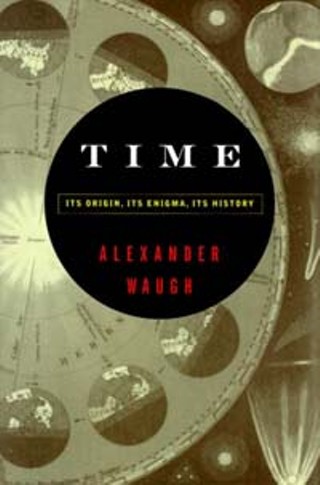Time: Its Origin, Its Enigma, Its History
Reviewed by Ann Guidry, Fri., June 23, 2000

Time: Its Origin, Its Enigma, Its History
by Alexander WaughCarroll & Graf, 288 pp., $25
Where did the beginning begin? Where shall it all wind up? Alexander Waugh is delighted to provide the answers to these and other queries in this engaging and insightful probe into all things time-related. Broken into chapters headed "Initium-Beginning," "Momenta-Seconds," "Minutae-Minutes" through Finis-End, the study of this greatest of mysteries manages to keep to less than 300 pages. Waugh, a critic, composer, and writer who is the grandson of Evelyn and son of Auberon, shares his wealth of knowledge with intelligence, curiosity, and, above all else, a tremendous sense of humor.
An inquiring mind as well as a sharp, dry wit is requisite for properly discussing creation myths of the Babylonians, the Roman numbering system, and Pythagorean philosophy (including abstinence from beans). His purpose, besides poking fun at the foibles of those before us, is to illuminate the trail of theories and cultural histories that brought us to our present impression of time and its various manifestations. Rich with historical irony and poetic cosmological pursuits, this vigorous study is, at its core, a study of humanity. In Waugh's words, "As a species we will insist on dividing and subdividing anything and everything until we are blue in the face."
There are touchstones -- such as Zeno's famous paradox about mathematics' relation to reality -- and then there are Waugh's divine digressions. One of these includes the mistake of the Julian calendar which, during its own time, was undetectable yet sure to create a headache for those centuries later. The error amounted to 11 minutes and 14 seconds per year (as mean solar years were not exactly 3651é4 days long) so by 1582 something had to be done since "the festival of Easter was turning into a mockery. It was now being celebrated on a date that was clearly not the true anniversary of the crucifixion." As you can imagine, the ensuing plots to right the year invite several sprawling (and intriguing) divertimentos.
Still, the capable writer gets us to "Finis" with wit intact. Waugh discusses time mostly as a cultural phenomenon as opposed to a scientific one, as evidenced by his references to Shakespeare, St. Augustine, Bertrand Russell, Buddha, and William Blake, as well as Einstein and Hermann Minkowski. By swirling ancient and modern philosophy with religious thought, with anthropology, with agrarian folk wisdom, Waugh concocts a heady mix to satisfy the inquisitive nature of every kind of knowledge seeker.








